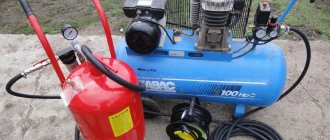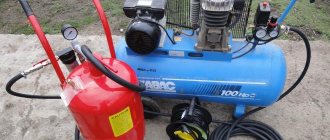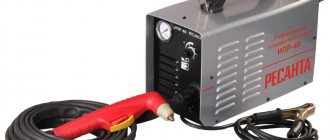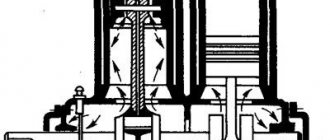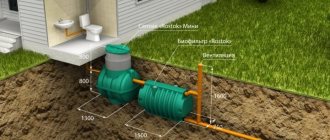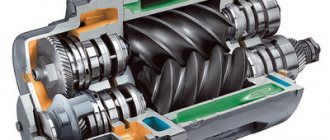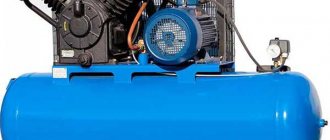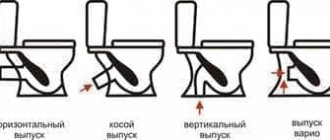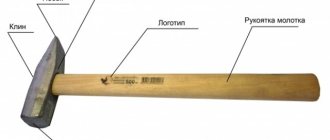- Difference between oil and oil-free compressor
- Advantages and disadvantages
- Scope of use
- Oil and air filter: installation
- Useful tips
What does a user expect from a quality compressor? Clean injected air, the required pressure, long-term operation and increased service life. And this is just part of the requirements.
Focusing on the buyer, manufacturers offer more and more advanced compressors every year. After all, pneumatics always remain relevant in the technology market. And without air supply it will not be able to work. A modern compressor is applicable to a wide variety of types of pneumatic tools: from a screwdriver and spray gun to a jackhammer.
But, unfortunately, the reality is such that it is almost impossible to buy a compressor that ideally meets all the desired characteristics. Of course, a lot depends on the manufacturer and price of the compressor. But the basic problem of choice is the structure of the compressors itself. They come in two types: oil and oil-free.
Scope of application
The pros and cons we have indicated do not provide a clear answer to the question of which compressor is better, oil-based or oil-free. To choose the right compressor (with or without oil), you need to determine two main things:
- In what area will it be used?
- At what working pace will it be used?
There are areas of pneumatic application where stringent requirements are established. The rules prohibit the appearance of oil particles in the pumped air. Therefore, oil-free compressors are the only way out. These areas include:
- Medicine. A supply of clean air is needed, for example, in a dental unit.
- Food industry. Compressed air is used to make food products and packaging. Pharmaceuticals. To make medicines, you only need clean air. It should not contain even an amount of impurities.
- Production of upholstered furniture.
- Painting of various elements, including cars. With pneumatic spray guns, oil should not get into the paint in any way.
In addition to such important industries, oil-free compressors are often purchased for small jobs. It is cheaper and quite suitable for working with simple pneumatic tools. For inflating tires and blowing air. Oil-free compressors cannot withstand long cycles. But, for example, a screwdriver does not work for very long. Few seconds. During this time there will be no overheating.
If there are no specific tasks for air purity, then the choice is always in favor of an oil compressor. Its high performance and the ability to achieve the required pressure are used in many industries. Oil-fired units are suitable for daily operation for several hours. Can work for a long time. Oil models are also purchased for household work. At the dacha, in the house, in the garage.
Advantages of oil compressors
The main advantage of units with full oil supply is the long service life of the element base. Thanks to effective lubrication, parts of the same piston group receive a sufficient wear-resistant shell, which increases their durability. At the same time, the user can count on high performance. The massive structure can be used in factories and engineering production. However, under such conditions, almost any coaxial unit can operate - oil or oil-free. Which compressor is better in terms of continuous operation? With such a requirement, it is advisable to give preference to oil-based devices, since they are initially designed for long working sessions.
Main differences
Depending on the characteristics of the seals, compressors are available with lubrication (oil) and without it (oil-free). Let's look at their main features and differences.
In design
The design of an oil-type compressor uses an oil supply system (pipes, lubricator, pump). It is further complicated by the presence of several holes on the walls of the cylinder and its cover. Due to the presence of lubricant, friction between the oil system rings and the cylinder walls is reduced to a minimum. The piston is additionally mounted with split oil scraper rings with grooves for lubricant drainage.
Oil-free compressors have 2 types of rings on the piston. The seals prevent gas leakage, the guides prevent the piston from coming into contact with the cylinder walls. Rings are made from polymer compounds, graphite compounds, photoroplast.
ON A NOTE
. The rings of oil-free compressors are non-contact, so wear occurs very quickly. Due to the reduced service life of such rings, the operating cycle of the product at high pressure is no more than 200 hours.
On purpose
Conventionally, compressors can be divided into three large groups: industrial (the most powerful, respectively), semi-industrial (up to 1000 l/min) and household. The latter are autonomous devices for supplying air to refrigerators, small installations, pneumatic tools, etc. The choice of a suitable model in this case depends solely on personal preferences, type and volume of work. Oil-free is the best option for short-term work, oil-based for long-term work.
When choosing the right industrial compressor, there are a couple of supporting criteria to consider:
- Type of gas - oil-type compressors should be chosen very carefully, since with some types of gas the lubricant may enter into an uncontrolled reaction and an explosion may occur;
- Maintenance frequency - it is better to choose units with a significant service life.
In use
When using a compressor with lubricant, its level must be constantly monitored with periodic addition of the required amount and replacement of oil. Moreover, special brands are recommended for use. If we are talking about portable (mobile) compressor models, they must be kept strictly in a horizontal position (otherwise this risks spilling oil from the tank).
Oil-free compressors do not have the same problems as units with an oil system, but such devices require regular replacement of piston rings. As for other actions related to servicing compressors (cleaning filters, checking equipment, etc.), everything is identical here, regardless of the type of unit.
Oil-free compressors
In this type of compressor, the issue of lubrication is resolved differently. The cylinder walls are anodized and instead of three rings, the piston is equipped with one ring-type seal made of durable special Teflon material (PTFE or all kinds of ceramic-based composites can also be used as materials). These materials have a low coefficient of friction and can replace lubricants. The bearings mounted on the crankshaft are sealed and lubricated for a lifetime. The crankcase without oil compressor performs the function of preventing the entry of dirt, moisture, dust and acts as a barrier. The requirements for crankcase tightness are reduced many times over.
Oil-free compressors are chosen for air purity, ease of maintenance and quiet operation. The sound of operation without an oil compressor does not exceed human conversation (about 60 dB). The air leaving the compressor is clean, free of oil impurities, which is very important in certain types of work. The most important difference is that the oil-free compressor does not require maintenance - it is ready to start working immediately after its purchase.
Rice. No. 4 Modern oil-free compressors EXTEL
Areas of application
Oil-free piston compressors are widely used in those industries where sanitary standards or process technology do not allow oil to enter the air. Industrial oil-free compressors are mainly used in food and pharmaceutical industries, as well as enterprises producing electronic devices and microcircuits.
Low-capacity compressors (up to 200 l/min) operate on a 220V network, more powerful ones (from 450 to 1000 l/min) have a voltage of 380V and are installed on a receiver of 200 and 500 liters. A separate series of oil-free piston compressors is medical. All of them are powered by 220V and are equipped with a receiver from 8 to 100 liters. Due to their small dimensions and ease of use, EXTEL oil-free piston compressors are used in various chemical and mechanical engineering laboratories for experiments. The most compact compressors, installed on a 10-50 liter receiver (power from 0.75 kW to 1.5 kW), are also supplied in a noise-proof casing, which reduces the noise level to 57 dB, which makes it possible to use them in dental offices and directly in workplaces. production. In addition to the noise-insulating casing, some models of oil-free piston compressors are produced with a built-in refrigeration dryer, which allows them to be used for the production of microelectronics and in other areas of industry where moisture on the working surface is not allowed. However, when choosing between oil-free and oil-filled piston compressors, it should be taken into account that in some cases it is sufficient to install an additional compressed air filtration system after the oil-filled compressor. This will not only remove the smallest oil particles (even odor) from the air, but will also ensure air purification from solid particles (particle size up to 0.1 microns, content up to 0.01 mg/m3). We also note that this method is also more cost-effective, since the cost of an oil-filled compressor with a filtration system is less than the cost of an oil-free piston compressor, and its service life is longer due to the presence of lubricant in the compression cavity.
conclusions
Modern oil-free EXTEL LB series have improved design features: Teflon rings that reduce friction between the piston and cylinder. The electric motor runs at a lower speed.
EXTEL LB series compressors operate as long as oil-based direct-drive models, but are much quieter. The absence of oil makes the compressor easier to operate; it is ready for use immediately after purchase and does not require maintenance throughout its life. In addition, there is no need to purify the air - there are no impurities in it.
Rice. No. 4 Growth dynamics of the oil-free compressors market in the Republic of Belarus in 2014-2020
Advantages and disadvantages
It would seem, what could be simpler? Fill each compressor with oil and don't worry about friction. Why design an oil-free compressor if it obviously has a short resource? Everything seems to be correct. Yes, but there is a “small fly in the ointment” in the oil compressor. And it can ruin the “big barrel of honey”, which is the lubrication of rubbing parts with oil.
The fact is that the oil manages to get into the compressed air supplied by the compressor. It’s good when this happens, for example, in a pneumatic impact wrench. Droplets of oil will lubricate the joints. They will be easy to unscrew and tighten. But imagine drops of oil in a spray gun. The result is deplorable - a car painted with paint and oil. Catastrophe. Or know-how. But not high quality work.
So, the main disadvantage of an oil compressor is the presence of oil in the pumped air. In addition, the disadvantages of oil compressors include:
- The need for expensive compressor oil
- The need for periodic filling
- Need constant monitoring and oil changes
- Higher price of the compressor itself due to its complex design
- Some weight gain
In fact, such disadvantages are trifles and not so important. But we get really important advantages :
- Reliability. Several times increased service life. Engine life increases because parts do not wear out
- No overheating. No friction - no overheating
- Possibility of a long cycle of work. Important for many air tools
- High performance
- Saving power consumption. The tool consumes less engine power
Oil-free compressors supply perfectly clean air. Undoubtedly, this is their significant advantage. But it is also almost the only one. There are, however, some other advantages of oil-free compressors . They:
- They cost less
- Weigh less
- No oil filling or replacement required
That is, oil-free compressors save your time and money when purchasing. Partial savings occur during operation (no need to buy oil). But they are by no means a reliable investment. Oil-free ones have many significant disadvantages :
- Very small resource
- Less productivity
- No high pressure
- Low power
Therefore, buying an oil-free compressor is only relevant for certain areas of work. Where oil type is prohibited. Or for small household work.
Pros and cons of an oil unit
An oil compressor has a number of advantages:
- the presence of a lubricant that reduces friction of contacting surfaces. As a result, wear on key equipment parts is reduced.
- sealing the gaps between the rotors and the housing;
- removal of heat generated during compression.
Flaws:
Release of oil particles into the compressed air. Manufacturers are trying to cope with this and use cyclone separators and main filters built into the pneumatic line. However, there is still oil in the air and it is impossible to completely get rid of it. Operation of an oil-filled unit is only possible in environments where the presence of oil crumbs is acceptable.
The oil must be constantly topped up and constantly changed after 2 thousand hours of operation. Separators and filter cartridges should be changed regularly. The duration of their operation depends on the manufacturer.
Choices.
If you need a cheap, simple compressor for occasional short-term spray and blow gun work, choose from inexpensive oil-free coaxial drive compressors. These are offered in the range from 7,000 to 9,000 rubles
If you need a compressor for work using wrenches, drills, rivets and nail guns, pay attention to inexpensive medium-power oil compressors with a good reservoir volume. This model will cost you 7,000-12,000 rubles.
If you are doing decorative work and plan to use a sandblasting gun, you need a compressor with the appropriate capacity and operating pressure. Such a compressor will cost from 8,000 rubles.
If you are the owner of a car repair shop and expect to use 2-3 impact wrenches at the same time, you will need an oil compressor with high performance and a rather large receiver volume. But it will also cost a lot - from 28,000 rubles.
This is interesting: Compressor PKSD-5.25 - technical characteristics and advantages
Characteristics of compressors.
Regardless of whether you buy a belt or coaxial, oil or oil-free compressor, they all have some common characteristics that you need to pay close attention to before purchasing:
Power. The higher the motor power, the higher the performance, and, accordingly, the more consumers can be connected to the compressor and the more diverse they are. How to choose power? It is better to select it not directly, but according to the required performance and maximum pressure. The same parameters are selected based on which tools and in what quantity will be used simultaneously with the compressor.
Pneumatic tools and the compressor parameters they require.
| Tool | Pressure (bar) | Capacity (l/min) |
| Spray gun | 3-6 | 250-400 |
| Tire inflation | 3 | 50 |
| Grinder | 6-7 | 180-450 |
| Blow gun | 4 | 150-200 |
| Sandblasting gun | 8 | 250 |
| Angle wrench | 6-7 | 85-250 |
| Impact wrench | 6-7 | 250-450 |
| Drill | 6-7 | 100-300 |
| nail gun | 6-7 | 100-350 |
The performance of a compressor is the volume of air it produces per minute. To determine compressor performance, add up the required performance of all simultaneously operating tools. When selecting a compressor, you must keep in mind that the passport usually indicates the volume of intake air under ideal (20 degrees Celsius) conditions. At the compressor outlet, due to air losses in the compressor and due to different operating conditions, the performance may be 20-30% lower than declared. Therefore, the performance of the selected compressor should be 30% higher than that required for the operation of existing tools.
Pressure. The operating pressure of the compressor is also selected based on the requirements of the tool used. No matter how many tools will be used at the same time, choose the maximum pressure required. This will be the operating pressure of the compressor. For some tools (eg spray guns, blow guns, tire inflators) overpressure is contraindicated. If such a tool is to be used, pressure adjustment . The presence of a pressure gauge will be useful in any case - it will make sure that the compressor is really working and creating the required pressure.
Receiver volume . A receiver is a metal tank that serves to store a certain supply of compressed air. The larger the receiver volume, the less often the compressor will turn on, i.e. increasing the volume of the receiver reduces the load on the compressor and engine. The downside of a large receiver is that it takes some time for the compressor to build up operating pressure in it. If the power of the compressor is low, and even if the pressure is taken off by some working tool, the pressure in the large receiver (and therefore at the compressor outlet) can take a very long time to build up. Therefore, an increase in receiver volume must be accompanied by a corresponding increase in performance and power. The exception is when the compressor is periodically required to produce short but high performance: for example, when using an impact wrench. It requires a capacity of 300 l/m, but if you connect it to a compressor with a capacity of 200 l/m with a large (50 l) receiver, this will be enough for the impact wrench to start and work for some time.
overheating protection on the compressor is also highly desirable. No reciprocating compressor can operate continuously for a long time. The presence of a receiver of the appropriate volume gives the compressor the opportunity to periodically “rest” for cooling, but if the air intake is close to the compressor’s capacity, then the breaks between starts become too short and the compressor does not have time to cool down. If the air intake exceeds the compressor capacity, the engine will not turn off at all. This can lead to overheating of the compressor and failure. That is why the compressor should always have a performance reserve.
The weight of the compressor can be quite significant - up to 100 kilograms! If the compressor is supposed to be installed permanently and connected to the main line (for example, in a garage), then weight is not so important. But if the compressor is intended to be used in different places, and its mobility is necessary, you should opt for a lighter model. Or at least equipped with wheels .
Compressors are some of the noisiest types of electrical equipment. Even if your compressor will be used in production, remember that prolonged exposure to noise levels above 80 dB is harmful. If the compressor is supposed to be used near housing, even more care should be taken to select a model with a lower noise level .
Summing up - who is better?
Order special equipment on our website: Compressors and jackhammers in Russia
When answering the question of which is better - an oil or oil-free compressor, it is impossible to give a definite answer. It all depends on the scope and purpose of use, the operating pace at which further operation is planned, the type of work performed and a number of other characteristics.
To make the right choice, you need to carefully study the features of a particular type of equipment, as well as get advice from a competent specialist who will help you choose an installation that can be the ideal solution in each specific case.
Installation of oil and air filters
If the application requires clean, oil-free air, but oil-free compressors do not meet the requirements for performance and continuous operation time, a solution exists. This is an oil air filter. It is installed at the outlet of the compressor and, passing all the air in the line through itself, retains the suspension contained in it on its plates.
Structurally, it is made in the form of a flask with two pipes, included in the break in the air line. There is a filter element inside the flask; it should be replaced regularly. A valve may be provided at the bottom of the flask to drain retained oil.
The filter has a number of disadvantages:
- reduces productivity and working pressure;
- requires periodic replacement of the filter element and draining of the oil;
- does not guarantee 100% air purification.
Therefore, where absolute cleanliness of the working environment is required, the assembly (oil compressor + air filter) is not used.
How to choose a suitable compressor?
- For short-term work with pneumatics at low pressure, an oil-free compressor is better suited;
- For work in the pharmaceutical and food industries, again, the oil-free option is optimal;
- For construction work, as well as in industrial conditions, there is no better option than an oil compressor. Despite the rather high cost, it will fully justify it in this case.
Area of use: intersect or not
Applications for oil and oil-free compressors may overlap, but some industries have particularly stringent requirements in terms of the type of compressor installation.
So, for example, in medicine and, in particular, in dentistry, oil-based air blowers cannot be used, since microparticles of oil can be supplied along with it, which is simply unacceptable. These units are also prohibited in the food industry, pharmaceutical industry, when performing paint and varnish work, etc.
But in situations where there are no special requirements for air quality, you can purchase an oil compressor, characterized by high performance and the ability to pump air under enormous pressure. Such installations are suitable for daily long-term use both in industry, public utilities and national economy, and for meeting the needs of private households.
Differences during operation
The main differences when operating an oil compressor from an oil-free one:
- Constantly monitoring the oil level and adding it as necessary;
- complete oil change during periodic scheduled maintenance.
Lubricants should be purchased strictly recommended by the manufacturer. Otherwise, in the event of a breakdown, you may lose your warranty, and the likelihood of such a breakdown increases significantly.
Such units must operate in a horizontal position without exceeding the permissible slope specified in the passport. Otherwise, lubrication conditions will deteriorate or oil will simply leak out of the crankcase.
Oil-free machines only require periodic replacement of the piston rings.
Cleaning air filters, checking and servicing fittings on an oil-free compressor is carried out without any differences.
Popular models
Air compressors are designed for inflating tires, painting production, carrying out construction work, for equipping enterprises in the production of products and services, etc. In each individual case, the parameters for choosing an installation are individual.
Berg VK22R
Oil-filled screw compressor with belt drive, efficient and durable motor with IP55 protection, standard voltage 380V. The design features an air-cooled oil heat exchanger allowing operation in the hottest conditions.
The advantages include:
- low level of noise and vibration;
- fully electronic control system;
- built-in programmable controller.
Remeza VK7E-8-500D
Industrial model of a screw type oil compressor. Equipped with a belt drive and an air receiver with a volume of 500 liters.
Advantages of the model:
- high quality compressed air;
- the durability of the equipment is ensured by a German screw block and electric motor;
- An electronic controller with an LCD display and a push-button remote control allows you to control the operation of the device in any conditions.
ABAC Genesis 15
The oil-filled unit of the Italian manufacturer is a universal screw-type compressor station. It is used in almost any area: construction, industry, production.
The advantages are worth listing:
- built-in refrigeration air dryer brings dew point to 3 °C;
- a cyclone-type separator and a main filter remove up to 90% of oils and dirt from compressed air;
- The receiver eliminates pulsations when supplying compressed air and at the same time serves as an additional capacity.
Design features of oil-free models
In general, the technical and structural basis of such compressors is similar to their oil-based counterparts. The basis is the same piston group, power unit, crankshaft, etc. The difference comes down precisely to the approaches to organizing the cleaning system. In the case of oil equipment, air flows intersect with lubricant supply channels. Conversely, the design and advantages of an oil-free compressor are interrelated and are due to the fact that the lubricating fluid and air flow pass through different channels. Oil is not poured into the crankcase, but is sent to a special cleaning system. Therefore, it cannot be said that oil-free coaxial models are completely devoid of lubrication. It is only limited to the design nuances of the feed, which has both pros and cons.
